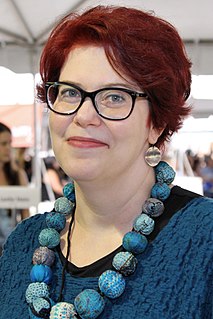A Quote by Sarah Waters
I suppose I really seemed mad, then; but it was only through the awfulness of having said nothing but the truth, and being thought to be deluded.
Related Quotes
The Supreme Court said nothing about silliness, but I suspect it may play more of a role than one might suppose. People are, if anything, more touchy about being thought silly than they are about being thought unjust... Probably the first slave ship, with Negroes lying in chains on its decks, seemed commonsensical to the owners who operated it and to the planters who patronized it. But such a vessel would not be in the realm of common sense today. The only sense that is common, in the long run, is the sense of change.
She [Alice] went on "And how do you know that you're mad?" "To begin with," said the Cat, "a dog's not mad. You grant that?" "I suppose so," said Alice. "Well, then," the Cat went on, "you see, a dog growls when it's angry, and wags it's tail when it's pleased. Now I growl when I'm pleased, and wag my tail when I'm angry. Therefore I'm mad."
When someone seeks," said Siddhartha, "then it easily happens that his eyes see only the thing that he seeks, and he is able to find nothing, to take in nothing because he always thinks only about the thing he is seeking, because he has one goal, because he is obsessed with his goal. Seeking means: having a goal. But finding means: being free, being open, having no goal.
I’ll never die", he said. Before I could protest, Lucas put two fingers on my lips, his smile seemed to fill the room with lights and I realized he was telling a deeper kind of truth then I’d ever known before “You’ll live forever and being remembered by you is the only immortality I’ll ever need if I only live on as a part of you – Bianca, that’s my idea of heaven
What really counted was the possibility of escape, a leap to freedom, out of the implacable ritual, a wild run for it that would give whatever chance for hope there was. Of course, hope meant being cut down on some street corner, as you ran like mad, by a random bullet. But when I really thought it through, nothing was going to allow me such a luxury. Everything was against it; I would just be caught up in the machinery again.
Then he read the words of the scroll slowly, first in Japanese and then carefully translated into English: 'There is really nothing you must be. And there is nothing you must do. There is really nothing you must have. And there is nothing you must know. There is really nothing you must become. However. It helps to understand that fire burns, and when it rains, the earth gets wet. . . .' 'Whatever, there are consequences. Nobody is exempt,' said the master.
When I was very little, say five or six, I became aware of the fact that people wrote books. Before that, I thought that God wrote books. I thought a book was a manifestation of nature, like a tree. When my mother explained it, I kept after her: What are you saying? What do you mean? I couldn't believe it. It was astonishing. It was like--here's the man who makes all the trees. Then I wanted to be a writer, because, I suppose, it seemed the closest thing to being God.
Why, in truth, sir," was Monte Cristo's reply, "man is but an ugly caterpillar for him who studies him through a solar microscope; but you said, I think, that I had nothing else to do. Now, really, let me ask, sir, have you? — do you believe you have anything to do? or to speak in plain terms, do you really think that what you do deserves being called anything?
And it really doesn't matter if we're under our desks with our hands over our heads or not, does it? No, said Mrs. Baker. It doesn't really matter. So, why are we practicing? She thought for a minute. Because it gives comfort, she said. People like to think that if they're prepared then nothing bad can really happen. And perhaps we practice because we feel as if there's nothing else we can do because sometimes it feels as if life is governed by the slings and arrows of outrageous fortune.






































